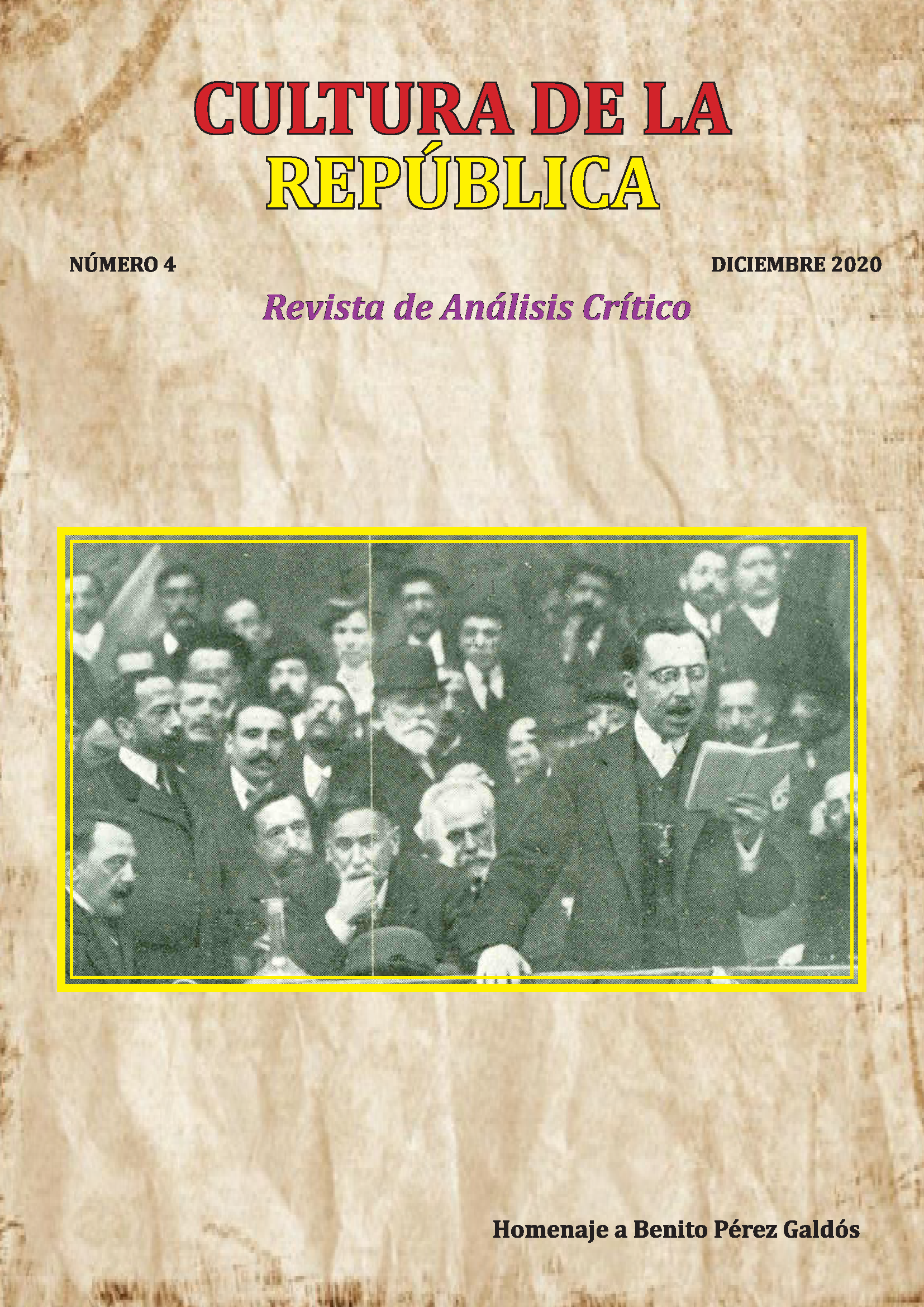Working-class issue and the new woman: people, bourgeoisie, and feminism in Benito Pérez Galdós
Keywords:
Galdós, liberalism, working class, women, socialismAbstract
The present research aims to demostrate that Galdós has always sympathized with the working-class since 1870. Since 1906 he entered into politics as deputy and then president of the Republic and Socialist Union; after having first joined liberal position, at the beginning of the new century he moved towards Socialism. His political commitment leads him to participate into political meetings and official ceremonies until his death; moreover, his pieces written for theatre testify his political and social activity. On this basis, we shall analyze from the Social History and the Genres Studies the most important political speeches
and two precious plays, such as Electra (1895), and Celia en los infiernos (1913).
Downloads
References
Alas, “Clarín”, L. (1889). Folletos Literarios, Celebridades españolas contemporáneas, Benito Pérez Galdós, estudio crítico-biográfico por Leopoldo Alas (Clarín). Madrid: Estudio Tipográfico de Ricardo Fé.
Berenguer, A. (1988). Los estrenos teatrales de Galdós en la crítica de su tiempo. Madrid: Editorial Consejería de Cultura de la Comunidad Autónoma de Madrid.
Blanco-Aguinaga, C., Rodríguez Puértolas J. y Zavala, I. M. (1981). Historia social de la literatura española (en lengua castellana) II, (2ª ed.). Madrid: Editorial Castalia.
Bravo-Villasante, C. (1970). Galdós visto por sí mismo. Madrid: Editorial Magisterio Español.
_____. (1973). Vida y obra de Emilia Pardo-Bazán. Madrid: Editorial Magisterio Español.
Del Olmo, A. R. (2003). De Realidad a Santa Juana. Hermenéutica del teatro galdosiano. (Tesis doctoral). Madrid: Universidad Autónoma de Madrid.
Del Río, Á. (1969). Estudios Galdosianos. New York: Las Americas Publishing Company.
Fernández Cordero, C. (2013). «Galdós frente al movimiento obrero. El movimiento obrero frente a Galdós». Actas del décimo Congreso Internacional Galdosiano. Sección 3. Galdós y el debate político de una época, 289-297.
Fox, I. E. (2005), «Galdós´Electra: a Detailed Study of its Historical Significance and the Polemic between Martínez Ruiz and Maeztu». Anales Galdosianos, I (1966), 131-141.
Fuentes, V. (1982) Galdós demócrata y republicano (escritos y discursos 1907-1913). Santa Cruz de Tenerife: Algol.
López Nieto, J. C. (1990). «Electra o la victoria liberal. Una nueva interpretación a la luz de la situación histórica española de hacia 1900». Actas del cuarto congreso internacional de Estudios Galdosianos, Congreso IV, volumen 1. Novela y teatro, 711-730.
Merchán Cantos, C. (2013). «Celia en los infiernos (1913): variaciones sobre el tema de la “mujer nueva” en Galdós». Actas del décimo Congreso Internacional Galdosiano. Sección 1. Los fundamentos de la escritura galdosiana, 84-90.
Pardo Bazán, E. (1999). La mujer española y otros escritos. (Ed.) Guadalupe Gómez-Ferrer. Madrid: Ediciones Cátedra.
Pérez Galdós, B. (2002) La de San Quintín - Electra. (Ed.) Luis F. Díaz Larios, Madrid: Ediciones Cátedra.
_____. (2003). Tristana. (Ed.) Raquel Arias Careaga, Madrid:Akal.
_____. (2005). Fortunata y Jacinta. (Ed.) Julio Rodríguez Puértolas, Madrid: Akal.
_____. (2007). Las tormentas del 48. (3ª Ed.). Madrid: Alianza Editorial.
_____. (2009). Teatro Completo. (Ed.) Rosa Amor del Olmo. Madrid: Ediciones Cátedra.
Pérez Garzón, J. S. (2018). Historia del feminismo. Madrid: Catarata.
Rodríguez Puértolas, J. (1975). Galdós: Burguesía y Revolución.Madrid: Ediciones Turner.
Sánchez-Gey Venegas, J. (2013). «Utopía, sueños y política en Celia en los infiernos», en Actas del Décimo Congreso Internacional de Estudios Galdosianos, Sección cuatro. Episodios Nacionales. Galdós e Hispanoamérica. Teatro. Biografía, 474-479.


